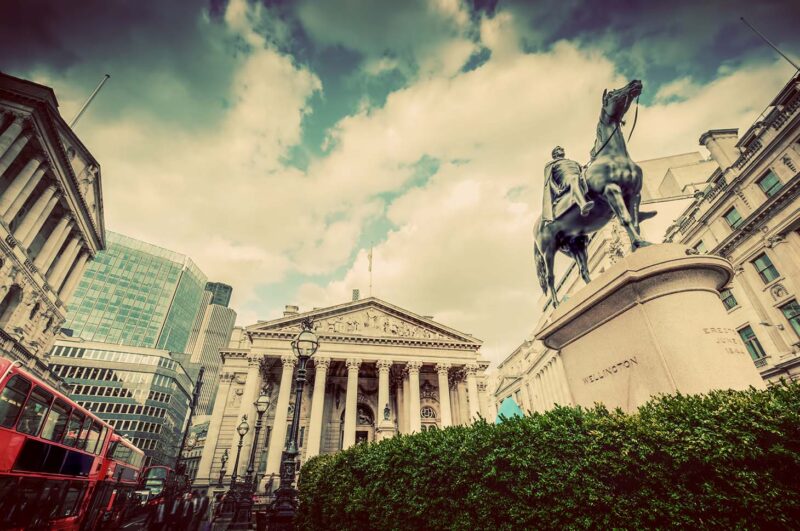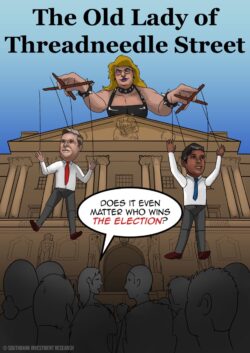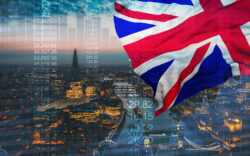In today’s issue:
- Is inflation really back for good?
- No amount of QE got inflation going between 2009 and 2021
- Bonds could be the steal of the century at these prices
Welcome to part two of my analysis on inflation’s future. Until yesterday, I’d been warning you about a sustained rise in inflation. But just as the markets have begun pricing in my forecast, I’m getting doubts…
Yesterday we looked at why inflation is now expected to surge. And how financial markets are reacting to this, badly. But they may be misreading things.
Until inflation broke out in 2021, the biggest mystery facing investors was why it hadn’t surged before then. It wasn’t for want of trying.
Governments and central banks certainly tried to engineer inflation. They used quantitative easing (QE), fiscal stimulus and countless other measures to try and make prices go up towards their targets. That’s because they were so scared of deflation.
As you know from the government’s plans to use inflation to repay debt, inflation makes borrowing cheaper. So inflation is one way in which governments and central banks can engineer economic stimulus. They can push inflation higher to encourage more borrowing. This is true of business investment and households too.
The thing is, until 2021, nothing worked to get inflation pumping. No amount of money printing ignited prices. No amount of government borrowing or spending either.
The Japanese have been trying increasingly desperate policy tools for decades without success. Inflation remained stubbornly low there.
Some academics argued that inflation had been so low for so long that a period of high inflation would be excusable, even in violation of central bank mandates.
But the point I want you to focus on is that governments tried to engineer inflation for many, many years. And failed miserably. So their ability to trigger it is not beyond question.
But what about the inflation of 2021?
Ever since inflation broke out in 2021, just as I predicted it would, there has been a growing presumption that inflation is now a problem we are stuck with and must deal with. Interest rates have to go up and monetary policy must be tightened.
But I’m not sure the inflation shock of 2021-2022 actually provides any evidence that inflation is here to stay. It was not the type of inflationary shock I’d been warning about in 2020 – a deliberate government policy.
Instead, it was an external type of shock. One which is highly unlikely to repeat. That implies the inflation paradigm may not have actually changed at all.
My 2021 warning about imminent inflation focused on something called the velocity of money. More about that here. The point is that it was about the end of lockdowns. It was not about an economic policy to deliberately engineer a decade of inflation to deal with Covid debts.
Of course the effect of 2021’s inflation on government debt levels was enormous. Many countries crushed their debt-to-GDP levels on the back of inflation. But I don’t think this was the deliberate successful policy move which I anticipated in 2020. I think it was success by accident. It’s not like governments imposed and then ended Covid lockdowns to manage inflation statistics…
This creates a question about whether governments and central banks really can engineer sustained inflation. If 2021’s inflation was caused by the end of lockdowns, how will inflation be sustained at a high level in the future?
What if we are actually back in the pre-2021 paradigm of inflation being doggedly low and refusing to budge higher no matter what governments and central banks try to do to ignite it?
That is the opposite to what financial markets have been pricing in lately.
Demographics don’t hint at an inflationary destiny
Evidence out of Japan and now China suggests policymakers may struggle to keep inflation high. There are many powerful deflationary forces playing out in the world right now. Demographics being one of them. Especially if parts of Europe turn on immigration.
If we go back to a world where central banks and governments are unable to engineer inflation then the investment landscape looks radically different. The current bond market panic about inflation would be a big mistake.
Last week, the Treasury’s Debt Management Office sold £2.25 billion of new 30-year bonds at a yield of 5.2%. That’s the highest since 1998 and substantially higher than Greece. Since then, the yield has blown out even higher.
5.2% per year is an enticing return if you expect inflation to fall back below 2% in coming decades, and stay there. It is not enticing at all if you expect inflation to rise as governments attempt to inflate away debt.
It’s a very binary outcome with dramatically divergent performances for stocks and bonds.
Both scenarios remain possible. But ponder this question: what sort of an economy would we be in if inflation needs to run above bond yields in order to inflate away our government debts? Could inflation really outpace 5.2% for the next few decades?
I still think the probability is much higher than most investors are yet to realise. As more begin to wake up to this, bond yields are creeping higher.
But what if that worldview is wrong? What if inflation won’t stick?
Where will the inflation come from?
If 2021’s inflation came from Covid shocks and no amount of inflationary policies before 2021 managed to ignite inflation back then, what is the catalyst for inflation going to be for the next decade?
Is it a private borrowing binge that bids up prices?
I can’t see that emerging from our demographic pyramid…
Is a public borrowing and spending binge going to push inflation up?
Not from these debt levels…
Could a crash in the pound trigger inflation? Well, yes, in the sense that prices go up when your currency weakens. But not every country’s currency can crash at the same time in foreign exchange markets. So it would not be a broad based inflation. Nor could it last very long.
Are we going to go into and out of Covid lockdowns repeatedly to try and goose the velocity of money again, as we did in 2021?
I doubt it…
So I simply don’t see where the inflation is going to come from. Even if the government and central bank try to make it happen, it’s a difficult feat to achieve.
Perhaps investors should be worried about precisely the opposite to inflation.
Until next time,
Nick Hubble
Editor, Fortune & Freedom





